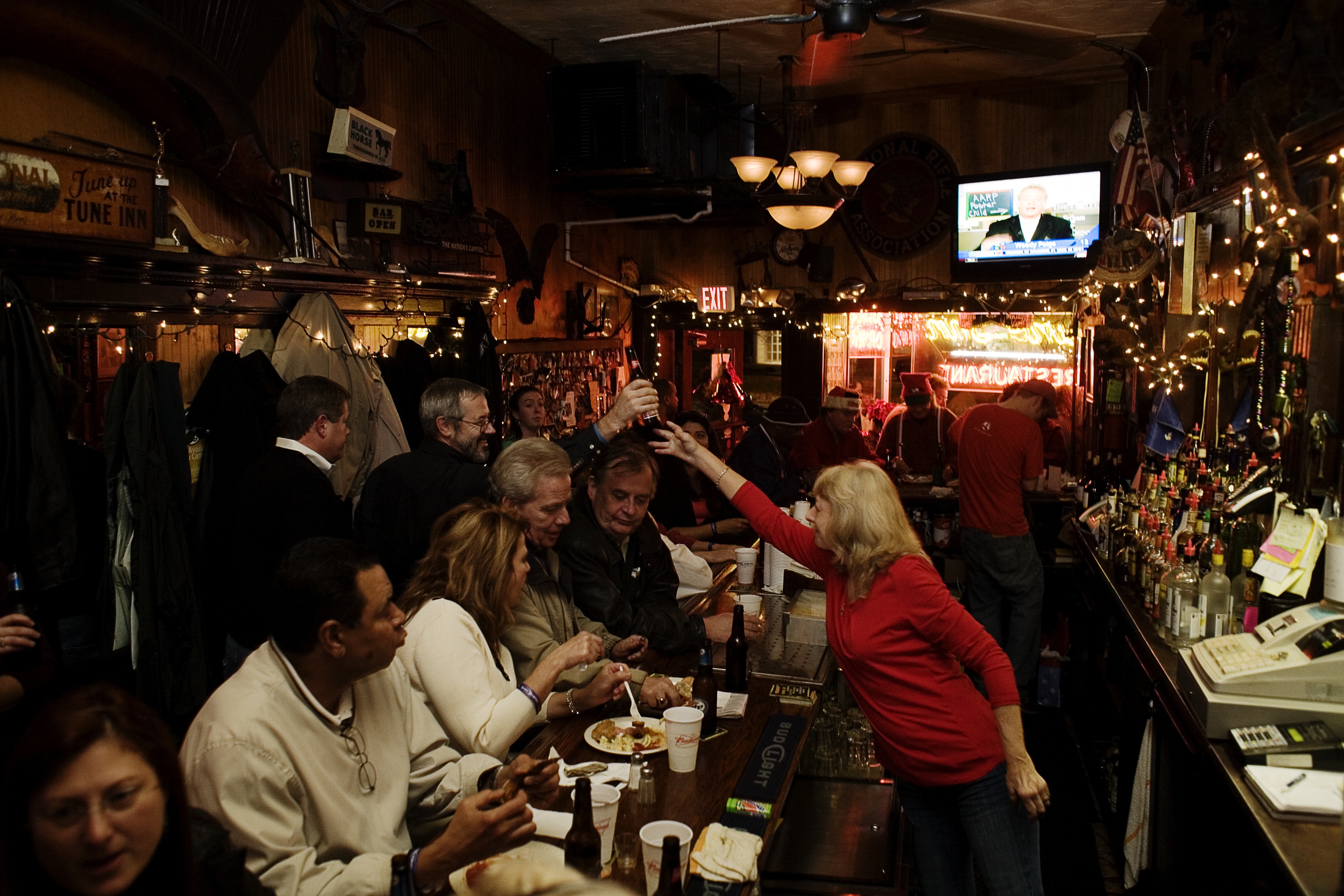I’m hugging a bottle of Anchor Steam at RFD in Washington, DC, sister establishment to the famed Brickskeller, watching a group of picketers wend their way around the crowded bar with signs reading, “We Want Beer.”
This city has a watering hole for every income bracket and taste.
It’s a puzzling sight, as everybody here seems to be well served. In fact, the “protest,” organized by Premium Distributors of DC, is actually a celebration of the 75th anniversary of Repeal, which took place on December 5, 1933 with the ratification of the 21st Amendment.

The legendary Tune Inn in the neighborhood of Capitol Hill. (Noah Devereaux )
Across the city, revelers are toasting Repeal on a day that the Wall Street Journal has dubbed “Cinco de Drinko.” And Washington, as I write this, is bracing for an even bigger blast on January 20, when Barack Obama takes the oath of office. The DC City Council has passed legislation allowing bars to serve alcohol until 5 a.m. for the four days preceding the Inauguration. The media is predicting that two to three million visitors might try to crowd into the city for the swearing-in of America’s first black president.
“I was talking with a cab driver, and he said the closest available hotel rooms are in West Virginia,” Charlie Papazian, president of the Brewers Association, told me earlier in the week. Papazian had flown in from Boulder, CO for the association’s biannual Capitol Hill beer tasting. He confers regularly with Congress’s Small Brewers Caucus, a group of 37 lawmakers who keep abreast of developments in the craft brewing industry and strive to educate their colleagues. Rep. Peter DeFazio (D-OR), cofounder of the caucus, is a homebrewer who (according to the Congressional newspaper The Hill) enjoys sipping his homemade pale ales on the porch of his Springfield, OR home.
This city has a watering hole for every income bracket and taste. If you’re an intern or a college student on a budget, prowling around for cheap beers and half-price burgers, you can solve the country’s problems over a couple pitchers at such Capitol Hill dives as the Hawk ‘n Dove, Bullfeathers and the Pour House.
If you’re a K Street lawyer on an expense account, you can plunk down $40 at Brasserie Beck, DC’s premier Belgian-style bistro, for an 11.2-ounce bottle of De Dolle Oerbier Special Reserva fermented in Calvados casks.
Capitol City Brewing Co., the local brewpub chain, was offering InaugurAle, a golden ale spiked with orange blossom honey from Obama’s home state of Illinois. The District ChopHouse, another brewpub, was brewing up Barack Bock. Premium Distributors was augmenting its portfolio with Primo, an old brand from Hawaii (Obama’s birthplace), as well as a lager and ale from a new operation called Half Acre Beer Co. in Chicago.
Premium also offers Shiner Bock, but that brand might have been more in vogue eight years ago when president-elect George W. Bush was toast of the town.
Tavern Negotiations
Administrations come and go, but alcohol has always lubricated the cogs of government. The city of Washington was, quite literally, born in a bar.
In 1790 Congress voted to establish a federal city on the Potomac River. But before all those marble building could rise from forest and marsh, the real estate had to be obtained from about a dozen-and-a-half landholders, some of whom insisted on driving a hard bargain. Among these was an irascible tobacco farmer named Davie Burnes who owned a large chunk of territory between where the White House and Capitol Hill stand today. He once sassed George Washington himself, insisting that “had ye nae married the widow Custis … you would hae been a land surveyor today, ane a mighty poor ane at that!”
However, large amounts of liquor can alleviate even the most trying negotiations, and a congenial tavernkeeper by the name of John Suter kept progress from stalling. His establishment, called Suter’s Tavern or the Fountain Inn, stood in Georgetown, a village that preceded Washington, DC by 40 years but was absorbed into the District of Columbia after the Civil War. It was here that Washington and Jefferson lodged when they visited the future capital; it was here that architect Pierre l’Enfant laid out the city’s streets and avenues; it was here that the first parcels of land were auctioned off.
No one today knows where “here” was, because eighteenth century buildings lacked addresses. A marker commemorating Suter’s Tavern sits near Georgetown waterfront, around the corner from a multiplex movie theater. An alternate view places the tavern on nearby Wisconsin Avenue, on a plot of ground now partly occupied by an erotic novelty shop.
The citizens who frequented Suter’s establishment probably drank wines imported from France and Portugal, Jamaican rum, and ale from Philadelphia or London. But Washington, DC soon had a local producer. A physician named Cornelius Coningham, sometime in the mid-1790s, set up a brewery/distillery in a two-story stone house not far from where the Vietnam Memorial stands today. Coningham proffered strong beer and a weaker “table beer,” sold whiskey and vinegar on the side, and raised hogs on the offal from his vats. He later moved to an abandoned sugar refinery on the opposite side of town, and quietly went out of business in 1811.









